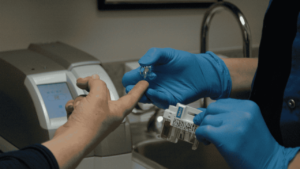How to Lower A1C Naturally: 7 Effective Natural Ways to Control Diabetes easily.
How to Lower A1C Naturally ? this is the basic question in now days life .Have you or anyone in your family been diagnosed with Pre-diabetes or Type 2 Diabetes? If yes, you have probably heard of A1C Level. A1C, also known as glycosylated hemoglobin, measures your average blood sugar (blood sugar) level over the past 2-3 months. A high A1C level indicates an increased risk of uncontrolled diabetes and its complications. The good news is that, with some key lifestyle changes, you can how to lower A1C naturally and improve your health. Medications are important, but natural methods can give better results while complementing them.
7 Effective Ways how to Lower A1C Naturally?

1.Adopt a Healthy Diet:
Your diet has the biggest impact on A1C levels.
Choose complex carbohydrates: Choose whole grains such as bajra, jowar, ragi, brown rice, oats and whole wheat roti instead of white bread, rice and pasta. They are high in fibre, which increases blood sugar slowly.
Focus on protein: Include sources of lean protein in every meal, such as pulses, beans, chickpeas, paneer, tofu, yogurt, eggs, fish and chicken. Protein helps keep blood sugar levels stable.
Lots of vegetables and fruits: Increase your intake of non-starchy vegetables such as spinach, broccoli, bitter gourd, gourd, and low glycemic index fruits such as berries, apples, guava, oranges in limited quantities.
Healthy fats: Include healthy fats like avocado, nuts, seeds and olive oil.
Avoid sweetened beverages and processed foods: Sodas, juices, desserts and processed foods contain hidden sugar and unhealthy fats that can raise A1C.
2.Exercise Regularly:
Physical activity makes your body more sensitive to insulin, allowing cells to better use glucose from the blood.
Goal for how to lower a1c naturally : Do at least 150 minutes of moderate-intensity aerobic activity (such as brisk walking, cycling, swimming) per week and strength training (weight lifting or body-weight exercises) 2-3 days a week.
Benefits how to lower a1c naturally : Exercise not only lowers A1C, but also improves weight loss, heart health and overall well-being.
3.Manage Your Weight:
If you are overweight, losing even a few kilos can significantly improve A1C levels. Fat around the belly is particularly associated with insulin resistance.
Goal: Lose weight gradually and in a healthy way through a balanced diet and regular exercise.
4.Get Enough Sleep for How to Lower A1C Naturally:
Sleep deprivation can disrupt your hormonal balance, leading to insulin resistance and increased blood sugar levels.
Goal: Try to get 7-9 hours of quality sleep every night. Create a regular sleep schedule.
5.Manage Stress:
Stress increases the production of hormones (such as cortisol), which can increase blood sugar levels.
Methods: Try stress-reducing methods like yoga, meditation, deep breathing exercises, spending time in hobbies, or spending time with nature.
6.Increase Fiber Intake:
Fiber, especially soluble fiber, slows blood sugar absorption and may help lower A1C.
Sources: Oatmeal, oats, barley, lentils, legumes (rajma, chana), nuts, seeds, and many fruits and vegetables (apples, carrots, broccoli).
7.Certain Supplements and Herbs for How to Lower A1C Naturally :
Certain natural supplements and herbs may be helpful in blood sugar control, but they should always be taken with the advice of your doctor.
Fenugreek: Helpful in controlling blood sugar.
Cinnamon: May improve insulin sensitivity.
Bitter Gourd: Traditionally used in diabetes management.
Neem: May help lower blood sugar levels.
Amla: Rich in vitamin C and antioxidants.
Frequently Asked Questions -How to Lower A1C Naturally?
Q1: How quickly can I lower A1C levels naturally?
A1: It takes time to lower A1C levels naturally, as it reflects the average blood sugar over the past 2-3 months. With consistent and effective lifestyle changes, you can see significant improvements in 3 to 6 months. However, individual results depend on the individual’s condition, dedication, and initial A1C level.
Q2: Can A1C be lowered by changing diet alone?
A2: Diet plays the most important role in controlling your A1C levels. A balanced and healthy diet that includes complex carbohydrates, adequate proteins, healthy fats, and high fiber can be highly effective in lowering A1C. However, other factors such as regular exercise, weight management, and stress management are equally important.
Q3: What types of exercise should I do to lower A1C?
A3: Aerobic exercise such as brisk walking, jogging, cycling, swimming (at least 150 minutes per week) and strength training or weight lifting (2-3 days per week) are both beneficial for lowering A1C. These muscles become more sensitive to insulin, which leads to better use of blood sugar.
Q4: Can I lower A1C completely without prescription medications?
A4: If you have prediabetes, it is often possible to reduce A1C to normal levels with lifestyle changes (diet and exercise) and avoid the need for medication. However, if you have already been diagnosed with type 2 diabetes and are taking medication, do not stop medications without consulting a doctor. Natural methods are helpful, but they are not always a substitute for medications. Always consult your doctor.
Q5: Which Indian foods are best for lowering A1C?
A5: The Indian diet has many excellent options for lowering A1C:
Cereals: Bajra, jowar, ragi, brown rice, daliya, oats, whole wheat roti.
Pulses and legumes: moong dal, chana dal, rajma, chickpeas, lobia.
Vegetables: bitter gourd, bottle gourd, spinach, fenugreek, broccoli, cabbage, bhindi.
Fruits: berries, guava, apple, orange, papaya (limited amounts).
Nuts and seeds: almonds, walnuts, chia seeds, flax seeds.
Spices: cinnamon, turmeric, fenugreek seeds.
Q6: Can any herbal supplements help lower A1C?
A6: Certain herbs such as fenugreek, cinnamon, bitter gourd, and neem are traditionally believed to be helpful in controlling blood sugar. However, always use these supplements after consulting your doctor or nutritionist, especially if you are already taking any medications, as they may interact with medications.
Q7: Is it difficult to maintain A1C once it is low?
A7: Lowering A1C and maintaining it at a healthy level is an ongoing process. This means that you have to adopt healthy lifestyle changes permanently. If you go back to old habits, A1C is likely to increase again. It is important to monitor your blood sugar regularly and keep getting check-ups from the doctor.














Post Comment